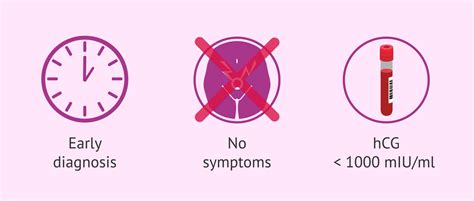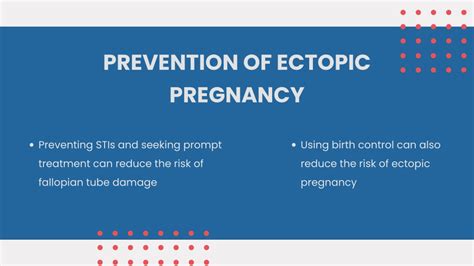Intro
Treat ectopic pregnancy effectively with 5 proven methods, including medication and surgery, to address symptoms and prevent complications, ensuring a safe recovery from this reproductive health issue.
Ectopic pregnancy is a serious medical condition that occurs when a fertilized egg implants outside the uterus, typically in the fallopian tube. This condition can be life-threatening if left untreated, and it's essential to seek medical attention immediately if symptoms persist. The importance of understanding ectopic pregnancy cannot be overstated, as it affects approximately 1 in 50 pregnancies in the United States. The topic of ectopic pregnancy is crucial for women of childbearing age, as it can help them recognize the warning signs and seek timely medical intervention.
Recognizing the symptoms of ectopic pregnancy is vital, as it can help women seek medical attention promptly. Common symptoms include severe abdominal pain, vaginal bleeding, and shoulder pain. However, some women may not experience any symptoms at all, making it essential to attend regular prenatal check-ups. Ectopic pregnancy can be caused by various factors, including previous pelvic surgery, infertility treatments, and smoking. Understanding these risk factors can help women take preventive measures and seek medical attention if they experience any symptoms.
The diagnosis of ectopic pregnancy typically involves a combination of physical examination, ultrasound, and blood tests. A healthcare provider may perform a transvaginal ultrasound to confirm the location of the embryo and check for any damage to the fallopian tube. Blood tests may also be conducted to check for the presence of the pregnancy hormone, human chorionic gonadotropin (hCG). If an ectopic pregnancy is diagnosed, treatment options will depend on the severity of the condition and the overall health of the woman. In this article, we will delve into the different treatment options available for ectopic pregnancy, including medical, surgical, and expectant management.
Treatment Options for Ectopic Pregnancy

Medical Management
Medical management is a non-invasive treatment option that involves the use of medications to treat ectopic pregnancy. The most commonly used medication is methotrexate, which works by stopping the growth of the embryo and allowing the body to absorb the pregnancy tissue. This option is typically recommended for women who have a small ectopic pregnancy and are stable. However, medical management may not be suitable for women who have a large ectopic pregnancy or are experiencing severe symptoms.Surgical Intervention

Laparoscopy
Laparoscopy is a minimally invasive surgical procedure that involves the use of a laparoscope to remove the embryo from the fallopian tube. This option is typically recommended for women who have a small ectopic pregnancy and are stable. Laparoscopy has several benefits, including smaller incisions, less pain, and faster recovery times. However, it may not be suitable for women who have a large ectopic pregnancy or are experiencing severe symptoms.Expectant Management

Risks and Complications
While treatment options for ectopic pregnancy are effective, there are several risks and complications associated with each option. Medical management may cause side effects such as nausea, vomiting, and abdominal pain. Surgical intervention may cause complications such as infection, bleeding, and adhesions. Expectant management may cause complications such as rupture of the fallopian tube, which can be life-threatening. It's essential to discuss the risks and benefits of each treatment option with a healthcare provider to determine the best course of treatment.Prevention and Risk Reduction

Importance of Prenatal Care
Prenatal care is essential for women who are pregnant or planning to become pregnant. Regular check-ups can help identify any potential complications early on, including ectopic pregnancy. A healthcare provider can perform regular ultrasounds and blood tests to monitor the pregnancy and detect any abnormalities. It's essential to attend all scheduled prenatal appointments and follow the recommended care plan to ensure a healthy pregnancy.Conclusion and Next Steps

To learn more about ectopic pregnancy and its treatment options, we invite you to comment below or share this article with others. If you have any questions or concerns, please don't hesitate to reach out to a healthcare provider. Remember, early detection and treatment are key to preventing complications and ensuring a healthy outcome.
What are the symptoms of ectopic pregnancy?
+The symptoms of ectopic pregnancy include severe abdominal pain, vaginal bleeding, and shoulder pain. However, some women may not experience any symptoms at all.
How is ectopic pregnancy diagnosed?
+Ectopic pregnancy is diagnosed using a combination of physical examination, ultrasound, and blood tests. A healthcare provider may perform a transvaginal ultrasound to confirm the location of the embryo and check for any damage to the fallopian tube.
What are the treatment options for ectopic pregnancy?
+The treatment options for ectopic pregnancy include medical management, surgical intervention, and expectant management. Each option has its benefits and risks, and it's essential to discuss the best course of treatment with a healthcare provider.
